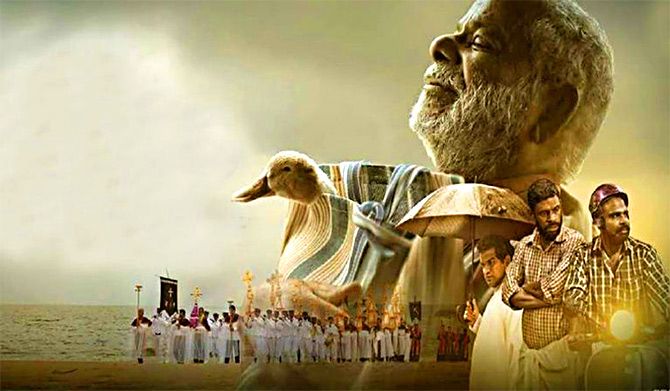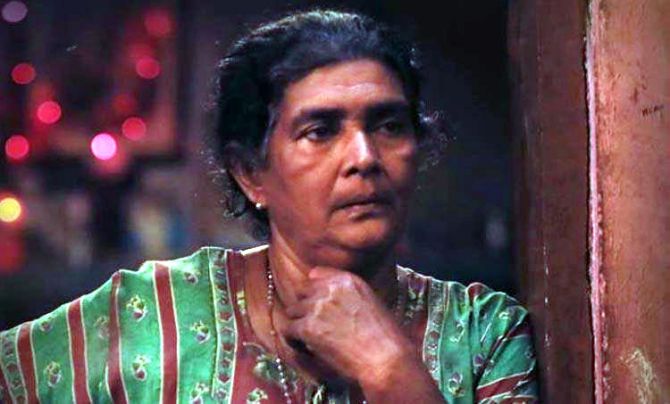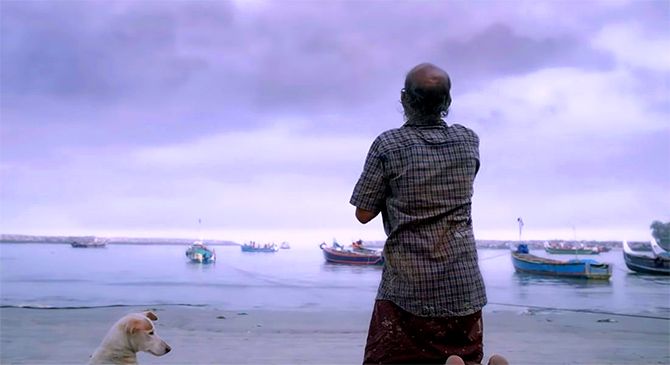Part of what makes Ee.Ma.Yau so special is its ability to focus our attention on things that conventional movies throw away under the pretext of storytelling, says Sreehari Nair.

Lijo Jose Pellissery's Ee.Ma.Yau unfolds in a coastal village in Kerala, between successive evenings, and is about not one but four deaths.
There are two men who get their tombs, a dog that 'meets its maker' while idling in the sand and a duck that is turned into dinnertime gravy for those very hands that last petted it lovingly.
Both men who die experience what the dog and the duck don't: Divine sightings in the sky. And one of the men is buried in the grave that he had personally dug for the other man.
Ee.Ma.Yau is partly a meditation on life (the final imagery reeks of Bergmanesque soul-wrestling) and partly a comedy of grief (there's more behavioural humour here than in any Indian film I have seen this year) but what it wholly and unambiguously is, is a film about death.
Death hovers above the characters and the setting of Ee.Ma.Yau, like the movie's grey skies over rushing waters, and the men and women don't just think about death -- they also chide, express their solidarity, threaten and flirt with one another in deathly terms.
'You go die, man,' is a girl's coquettish response to something her boyfriend says to her over the phone.
A local clarinet player spends his evenings at the village square playing funeral notes, to which a local lout remarks, 'If you continue playing this music, I will have to kill you.'
Men, who begin their conversations carelessly asking one another of their whereabouts, are, within one minute of this formality, issuing warnings about slitting each other's throats.
An old man (Vavachan, who is one of the two men who die in the course of film) and his son (Eeshi) salivate over the prospect of Vavachan's grand funeral, even as the daughter-in-law of the house (Elizabeth) pacifies the nomadic Vavachan's wife by whispering these words, 'Don't you worry; I have a plan that will tie Vavachan to one place forever.'
Poor Elizabeth has no idea that in an hour's time, her husband Eeshi would be out looking for the perfect coffin for Vavachan and the 'one place forever' ideal would be fulfilled in the unlikeliest of ways.
Lijo Jose Pellissery who, in his previous film, had achieved a collision of worlds out of a thin strand of Angamaly, is clutching onto a thinner strand this time and, using it, he tries to uncover the contradictions in the cosmos.
Ee.Ma.Yau is an existential comedy and at its very centre is God.
Pellissery's God, though, isn't all-good and all-powerful; He is, as a matter of fact, an aggregation of our myths, our fears and our fantasies. He maybe endowed with matchless imagination but He also possesses some of our biggest frailties.
The God of Ee.Ma.Yau gives Vavachan's son Eeshi (Chemban Vinod Jose) not a moment of peace to mourn the death of his father; and God afterwards drives Eeshi mad when Eeshi, far out on a final promise made, attempts to bring his father closer to God.
The God of Ee.Ma.Yau delegates his duties to those earthly minions who are devoid of basic compassion -- church fathers who double up as detectives; grumpy nurses; heartless moneylenders.
This God, however, is also an artist. God creates wind and rain to signal the oncoming doom and, at the precise instant that Vavachan dies, God directs a dog to start howling.
The God of this motion picture is maybe a lover of darkness, but He is also not without humour. God lets Vavachan's arch-enemy -- who wants to murder him, truly -- visit Vavachan'S dead body, declare his forgiveness of Vavachan publicly, and then bathe him before his final journey.
Here is a God who thinks and winks and to balance this existential, cruelly funny God, Lijo Jose Pellissery and scenarist P F Mathews introduce two Card Players (engaged in what seems like a never-ending Card Game), who take no active part in the story but function as intercessors of sorts, trading barbs that become metaphors for the movie's dramatic high-points.
When Vavachan's burial is on the verge of turning into a no-show, the Card Players (like the witches in Macbeth) chant to the sea, 'It's about to get muddled. But it will clear up soon. Only to get muddled again.'
The sound of the sea waves travels deep into those houses where the ungodly mortals of Ee.Ma.Yau live and the waves punctuate their dialogues.
These are people -- Latin Catholics, mostly -- whose tiny gossips have the power to distort truths. These are people unaware of the Eye of God that watches them, but who perform their religious services with alarming discipline.

Vavachan's wife Pennamma (Pauly Wilson) cries by practice and cries from memory.
She uses her grief to sketch out her life's greatest performance, reciting to those who arrive at the Vavachan Household, the relationship that the dead man shares with his visitors. In effect, she becomes Vavachan's interpreter for the living.
And what a pair of lungs!
She turns it on like clockwork and, at one point, when woken up by the parish clerk's rose-water, she adjusts her dress and resumes her wailing. By the end, the emotions inside her have dried up, but the animus in her performance stays!
As with the dewy-eyed Pauly, Ee.Ma.Yau's actors have all been cast for their faces.
One look at any of the profiles and they tell us that these people, regardless of how badly they maybe behaving, believe in the correctness of their actions; that these are faces who have earned the right to their each action.
When Vinayakan (who plays Ayyappan) drinks a glass of water, you can feel his thirst.
Ayyappan is Eeshi's best friend and Vinayakan and Chemban Vinod Jose, who are often cast as soul-brothers (in Sameer Thahir's Kali, the two appear together for 40 minutes and run away with the movie), don't just play off each other -- they seem clued into each other's unphrased thoughts.
Theirs is the kind of friendship that privileges Ayyappan to look suspiciously at the free-spending Eeshi (who will stop at nothing to give his father a majestic farewell), and ask at numerous points, 'Are you sure you are not losing your mind?'
And yet, when the taunt turns real -- like the curse of a female serpent -- and his friend does lose it, Ayyappan feels Eeshi's imbalance in his own blood.
Eeshi's final outburst is dramatic, but the movie is full of marvellous 'little things'.
In the way the furniture is arranged and rearranged, you are shown that the house of the dead is also a house that has to be equipped to 'welcome guests'. If anything, a death in your family improves your sense of hospitality.
The women who are slated to be the 'front-row grievers' borrow necklaces from those at the back. Barren necks are a truth that the front-row grievers just cannot afford!
The phone voices relaying the news of death overlap and, when they merge with the chattering of non-electronic voices, it gives birth to a new tune.
The big daring in Renganaath Ravee's sound design is its willingness to let the dialogues go to the point of illegibility even, in the movie's bid to ensure that our sense of reality isn't leeched out.
The dialogues may turn illegible, but the clarity never dims.
Toward the closing moments, the clamor of the crowd, the band music, the sound of the rain, the stomping of feet and the voices in Eeshi's head all become one piece, so that the frame between the audience and the actors stands dissolved.
The visual tone of Ee.Ma.Yau was, in all probability, fused with its soundscape at the film's prenatal stage, and Shyju Khalid's camerawork exists to illuminate this synchronicity.
The film is lit to near perfection but it’s not the sort of lighting that calls attention to itself.
In fact, Pellissery's and Shyju Khalid's primary approach is to light up big stretches of geography (streets, rooms, beaches), so that the actors can walk through them (as in stage performances) and take over the scenes.
There are more unbroken shots here than in Angamaly Diaries (which had its fair share), and it is to Shyju Khalid's genius and the unobtrusiveness of his framing that huge chunks of Ee.Ma.Yau play out like 'Live Cinema'.

Lijo Jose Pellissery may have gathered his bunch of merry minutemen, but the revolution is all his.
In following up the dazzling Angamaly Diaries with this film, Pellissery is going beyond pop into a land of strange calm.
But then generalise we can't this terrifyingly good New Wave of Malayalam Cinema, and forecast we shouldn't its pathways and windings because its ambition seems to lie outside Cinema's reputation as a pop-art: these filmmakers are aiming for the kind of glory that great novelists aim for.
To be living in a period when Lijo Jose Pellissery and Dileesh Pothan are making films shoulder to shoulder is not too different from living in an era when Faulkner and Hemingway released their novels within months of each other.
It is a case of two artists both trying to seize a moment in history and embody it in their separate ways; working with the same passion for complex themes and the same desire to stretch the vocabulary of the medium. (What a case of serendipity then that Ee.Ma.Yau shares some of its spirit with Faulkner's As I Lay Dying.)
Part of what make these movies so special is their ability to focus our attention on things that conventional movies throw away under the pretext of storytelling.
For the casual viewer, of the four deaths that occur in Ee.Ma.Yau, three may seem unremarkable, especially when weighed against Vavachan's sudden fall and the fight for his resting place.
We may overlook the other deaths, but Pellissery does not.
Using two seemingly unrelated shots, we're shown Vavachan's family doing its best to shield Vavachan's body from rain while a few miles away lies the gravedigger, dead and alone, and with rainwater splashing all over him.
Death stills them all -- the talkative and the silent, the emotionless and the wistful -- and so, to go with the two dead men, we get suggestive shots of the dog and the duck in their eternal relaxations.
As with all real artists, Lijo Jose Pellissery stamps his signature by pointing to us our casualness; our tendency to look away after our own, easy assimilations are complete.
In a weird way, through the cacophony and confusion of his burial, what I missed most was Vavachan's voice. And as if bored by the constant hubbub, at one point, the dead man opens his mouth.
This was a biological phenomenon raised to the level of a terrific cinematic moment, and it took me back to the time I first saw Vavachan.
There he sat, on a bus, with a duck in his arms.
On his brow and his mouth was the wisdom of someone about to dwell in worlds that others around him had not yet entered.
His face was like an old, smiling owl that had caught its prey.
And yet, he was alive.












 © 2025
© 2025